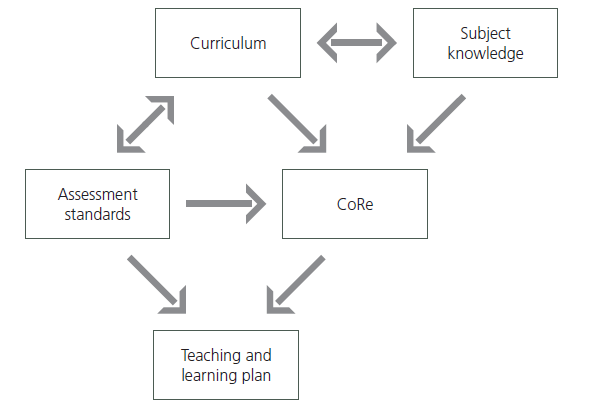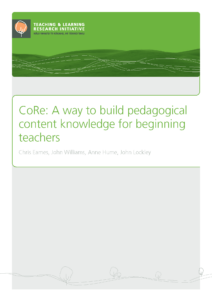Research has shown that one of the factors which enables teachers to be effective is their rich pedagogical content knowledge (PCK). Beginning teachers need support to develop this PCK and recent research in the field has proposed a conceptual tool known as “content representations”, or CoRes, as a model for doing this. The study reported here brought together science and technology experts in content and pedagogy, early career secondary teachers, and researchers to design a CoRe to assist development of teacher PCK. The study then researched the early career teachers’ use of the CoRe in their planning and delivery of a unit in their classrooms to examine the effect of the CoRe on teaching and learning, and on the development of the teachers’ PCK.
Key findings
The early career teachers felt that:
- participating in the design of the CoRe with the experts and then using the CoRe to inform their teaching had helped them establish the fundamental ideas of the topic they were teaching
- being involved in the process of designing the CoRe with the experts was as important as the product of the CoRe itself
- using the CoRe to inform their teaching helped them develop confidence in what they were teaching and to try new pedagogical approaches
- using the CoRe to inform their teaching helped them develop their pedagogical content knowledge.
Major implications
The major implications of the study are that:
- CoRes have potential for helping early career teachers gain access to content experts’ and expert teachers’ knowledge and experience
- consideration needs to be given to how all early career teachers can benefit from being involved in CoRe design with experts across a variety of learning areas and topics
- the nature of learning in science and technology is different, which has implications for the design of CoRes in these areas.
The research
One of the factors underpinning the performance of effective teachers is their rich pedagogical content knowledge (PCK), a special blend of content knowledge and pedagogical knowledge that is built up over time and experience. This form of professional knowledge, first theorised by Shulman (1987), is topic-specific and student-orientated, unique to each teacher, and only gained through teaching practice. In recent reviews of PCK (Kind, 2009; Rohaan, Taconis, & Jochems, 2010), the point is made that expert teachers are not “born” with PCK, and it is a lengthy process for student teachers and early career teachers to acquire the bank of skills and new knowledge needed to become expert teachers in their fields.
Recently, some researchers in science teacher education have begun investigating and devising pedagogical approaches to help student teachers and early career teachers conceptualise their professional learning, and begin laying a foundation for the development of their own PCK (e.g., Abell 2008; Loughran, Berry, & Mulhall, 2006; Nilsson 2008). One such approach being used successfully in pre-service science teacher education (Loughran, Mulhall & Berry, 2004, 2008) involves a conceptual tool known as a “content representation”, or CoRe, which makes explicit the different dimensions of, and links between, knowledge of content, teaching and learning about a particular topic. The CoRe, represented in table form (see table 1), gives an holistic overview of expert teachers’ PCK related to the teaching of a particular topic. It comprises a set of five to eight enduring ideas about a particular topic at the head of the columns, and a set of eight pedagogical questions for each row; the matrix is completed by considering the pedagogical questions for each enduring idea.
| Table 1. Sample CoRe matrix | ||||
| Enduring idea 1 | Enduring idea 2 | Enduring idea 3 | Enduring idea 4 | |
| What do you intend the students to learn about this idea? | ||||
| Why is it important for the students to know this? | ||||
| What else do you know about this idea that you do not know intend students to know yet? | ||||
| What difficulties/limitations are connected with teaching this idea? | ||||
| What do you know about student thinking which influences teaching about this idea? | ||||
| Are there any other factors that influence your teaching of this idea? | ||||
| What teaching procedures would you use, and why, for this idea? | ||||
| How would you ascertain student understanding of, or confusion about, this idea? | ||||
A recent study by one of us sought to initiate science student teachers’ PCK development by engaging them in the design of their own CoRe (Hume & Berry, 2010). The findings indicated that, with appropriate and timely scaffolding, the process of CoRe construction has the potential for promoting PCK development in beginning teachers. Concerns about the development of early career teachers in technology, as currently being researched by one of our research team (John Williams), suggested it would also be worthwhile to conduct research into the design and use of expert-informed CoRes in PCK development of early career technology teachers. Thus, we were interested to see how content experts, such as scientists and technologists, could help in the design of CoRes, how early career teachers might benefit from being involved with experts in this design process, and whether these teachers might use CoRes in their classrooms to enhance their teaching—and if so, how.
The following research questions guided the study:
- How can experts in content and pedagogy work together with early career teachers to develop one science topic CoRe and one technology topic CoRe to support the development of PCK for early career secondary teachers?
- How do early career secondary teachers in science or technology use a collaboratively-designed CoRe in their planning?
- How has engagement in the development and use of an expert-informed CoRe developed an early career teacher’s PCK?
- What are the student outcomes in learning of content, and experiences of pedagogy, from a unit in science or technology that was planned using an expert-informed CoRe?
Teachers typically enter secondary teaching in New Zealand with a degree in a specialist subject area and one year’s teacher education. At the start of their teaching, then, these teachers have specific content knowledge such as biology, chemistry or physics in science, or electronics, food technology or engineering in technology. However, the evidence suggests that even with this degree-level background, these early career teachers find it difficult to conceptualise the key concepts behind science and technology (Gess-Newsome, 1999; Loughran et al., 2008), particularly the nature of science and of technology—aspects which are prominent in The New Zealand Curriculum (Ministry of Education, 2007). While the one year of teacher education provides some support for development of general pedagogy, the time-frame allows only limited development of PCK in specialist subject areas. This issue becomes more acute for early career teachers who find themselves addressing science or technology topics in their classrooms that they may not have covered well in their undergraduate degrees.
Research process
The research had three key phases. Phase 1 consisted of the design of two CoRes—one in technology and one in science. They were designed in a workshop which was facilitated by a researcher with the help of one content expert and one pedagogical expert in each area. Other researchers in the research team observed the process and noted the contributions made by each member of the group, to understand how they worked together. These field notes became data, along with an interview at the end of the workshop with each group (the content and pedagogy experts and the early career teachers) regarding their experiences in the group, and their feelings about the development of the CoRe. These data were analysed against a community of practice framework to develop an answer to the first research question.
Phase 2 entailed an action research process in which each teacher was paired with a researcher. Each early career teacher separately planned the delivery of a unit of work in his or her school using the developed CoRe as a planning tool. The teachers kept reflective journals of their thoughts about this process, and these journals, together with field notes from discussions about between the teacher and research partner about the planning process, became the data which addressed the second research question.
Phase 3 involved the delivery of the planned unit by the early career teachers to their classes. The classes were observed by each teacher’s research partner, notes from which promoted later reflective conversations between the teacher and the researcher in the action research process. A final interview at the end of the unit between the teacher and the research partner provided a reflective summation of the teacher’s experience with the CoRe. Additional data were derived from a student pre- and post-unit questionnaire to examine development of student knowledge during the unit, and a focus group interview of students at the end of the unit explored students’ experiences of the teacher’s pedagogy.
Activity theory was used to frame the data collection and analysis. This theoretical approach focuses on the activity at hand, and the rules and roles that govern that activity. As the elements and focus of the activity changed through the phases of the research, from designing the CoRe to planning and teaching using the CoRe, this enabled our data collection and analysis to reflect each phase of the study.
Analysis of the workshop data in phase 1, the interview and journal data in phase 2 and the observation and interview data in phase 3 was carried out by the researchers. The early career teachers, as practitioner-researcher partners, were involved in the analysis of the student questionnaire data in phase 3. findings were collated and presented to the whole research team for interpretation and discussion in a second one-day workshop, during which each member brought their unique perspectives to the analytical process, creating a more robust outcome.
Findings
The content and pedagogy experts worked well with the early career teachers in designing their CoRes. The early career teachers noted that they valued the input of the experts and felt the design process had enabled them to access the knowledge about, and identify, the key concepts of the topic, as well as learn new pedagogical techniques for delivering particular content material. All the early career teachers reported that they felt that being involved in discussions with the experts in the construction of the CoRe helped them to understand the big picture of the topic. Although all the teachers kept in mind the needs of the curriculum and assessment through these discussions, they felt that the CoRe discussions were somewhat liberating in allowing exploration of what the topic itself was about. figure 1 below illustrates how the research team saw the connections between the CoRe and other influences on teaching and learning at senior secondary level.
| Figure 1. Model of how a CoRe might fit in senior secondary schooling |
 |
There was a variety of teacher responses to using the CoRe in their planning. For one chemistry teacher, the CoRe encouraged her to change the teaching sequence within the topic to focus on students learning some fundamental knowledge, which she felt paid off when she considered the students’ overall learning outcomes. For the other chemistry teacher, the CoRe design process encouraged her to focus more on relevant examples to illustrate how the topic was important in students’ daily lives. The teacher found this pedagogical strategy stimulating and the students enjoyed learning about these examples, but the teacher noted a need for readily accessible resources that provided more real-world applications of the chemistry topic. For the technology teachers, the CoRe encouraged them to weave more conceptual thinking into their lessons, something which the students found a little difficult, as they were more used to focusing on practical skill development. However, the teachers felt that the additional conceptual thinking would help the students understand more of the fundamental ideas behind materials technology, which they would be able to transfer to future projects.
All the early career teachers felt that being involved in the CoRe design and using the CoRe to guide their teaching had increased their confidence about what they were teaching. For most of the teachers, the CoRe lay behind much of what they thought about in the classroom but was not always explicit in their practice. The technology teachers credited the CoRe with helping them to decide what formative feedback to give to their students as they worked as individuals on their projects, making them more responsive to student needs, which could be interpreted as development of PCK. The chemistry teachers also used formative assessment to regularly check on students’ developing understandings and to moderate their teaching plan.
Implications
This study has indicated that CoRes developed in this way have potential for helping early career teachers to have access to content experts’ and expert teachers’ knowledge and experience. Our findings revealed a willingness for the experts to be involved in the CoRe design process, and that they felt that they gained a better understanding of the challenges that beginning teachers face in teaching their subject. Both the experts and the early career teachers enjoyed the opportunity to discuss the key concepts relating to the topic of the CoRe, and the ways to teach them. There was evidence that the mutually-informing outcomes of these discussions represented a worthwhile investment of time for all parties concerned. However, it was also clear that to create space for such a design process outside of a funded research project would require time commitment and innovative ways to collaborate between early career teachers and experts.
This implication leads to a consideration of how all early career teachers could benefit from being involved in CoRe design with experts across a variety of learning areas and topics. While the participants in this study clearly appreciated the opportunity to work face-to-face with experts, it would seem unlikely that such an opportunity could be provided for all early career teachers in all learning areas. A potential solution to this dilemma may be the use of electronic media. Applications such as Wikis or e-portfolios are already being used as collaborative work spaces in many areas of education. Bringing together a group of early career teachers and experts in a virtual space may allow for collaborative but asynchronous (and therefore time-flexible) development of CoRes. such a facility would have the potential to involve a greater numbers of early career teachers in a cluster; it would also allow for ongoing evolution of a CoRe as early career teachers develop their PCK. This latter idea is important, as development of PCK should not be seen as reaching an end point. Indeed, in the future, it would be interesting to return to the teachers in our study to examine how their PCK had further developed, and what their revised CoRe of the same topic might then look like.
A further implication of our study arose from the unsurprising finding that the nature of each learning area is different. For example, in this study, differences between science and technology were manifest in the historical conceptual thinking underlying each learning area, the way that the learning area is taught, and the traditional backgrounds of the teachers in those learning area. These differences raise implications for the design of CoRes in different learning areas. The original CoRe structure was designed in science, and while our technology teachers were able to work with the CoRe structure, there was some debate at the end of the project as to whether the set of eight pedagogical questions might be the most appropriate ones for all learning areas. Further research into the use of CoRes in other learning areas would help to respond to this question.
References
Abell, S. K. (2008). Twenty years later: Does pedagogical content knowledge remain a useful idea? International Journal of Science Education 30(10), 1405–1416.
Gess-Newsome, J. (1999). Secondary teachers’ knowledge and beliefs about subject matter and their impact on instruction. In J. Gess-Newsome & N. Lederman (Eds.), Examining pedagogical content knowledge (pp. 51–94). Dordrecht, The Netherlands: Kluwer.
Hume, A., & Berry, A. (2010). Constructing CoRes—a strategy for building PCK in pre-service science teacher education. Research in Science Education, 41(3), 341–355. doi: 10.1007/s11165-010-9168-3
Kind, V. (2009). pedagogical content knowledge in science education: potential and perspectives for progress. Studies in Science Education, 45(2), 169–204
Loughran, J., Mullhall, P., & Berry, A. (2004). In search of pedagogical content knowledge in science: developing ways of articulating and documenting professional practice. Journal of Research in Science Teaching, 41(4), 370–391.
Loughran, J., Berry, A., & Mullhall, P. (2006). Understanding and developing science teachers’ pedagogical content knowledge. Rotterdam, The Netherlands: Sense Publishers.
Loughran, J., Mulhall, P., & Berry, A. (2008). Exploring pedagogical content knowledge in science teacher education. International Journal of Science Education, 30(10), 1301–1320.
Ministry of Education. (2007). The New Zealand Curriculum. Wellington, New Zealand: Learning Media.
Nilsson, P. (2008). Teaching for understanding: the complex nature of pedagogical content knowledge in pre-service education. International Journal of Science education, 30(10), 1281–1299.
Rohann, E., Taconis, R. , & Jochems, W. (2010). Reviewing the relations between teachers’ knowledge and pupils’ attitude in the field of primary technology education. International Journal of Technology and Design Education, 20(1), 15–26.
Shulman, L. (1987). Knowledge and teaching: Foundations of the new reform. Harvard Educational Review, 57(1), 1–22.




